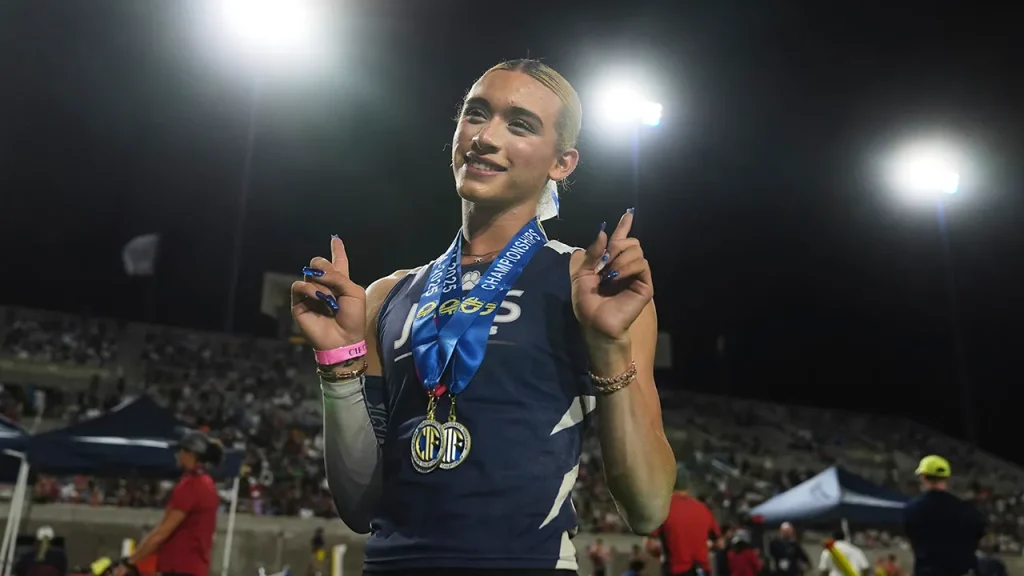Transgender Athlete’s Presence on Girls Volleyball Team Sparks Controversy and Forfeits
In the picturesque setting of Jurupa Valley, California, a high school volleyball team finds itself at the center of a brewing storm that touches on deeply held beliefs about gender, sports, and inclusion. Jurupa Valley High School’s girls volleyball team has achieved remarkable success this season, standing undefeated in league play with a 6-0 record and an overall 14-8 standing. However, beneath these impressive statistics lies a complex situation: eight of those victories, including one league win, came through forfeits from opposing teams. While these teams haven’t explicitly stated their reasons, the presence of transgender athlete AB Hernandez on the Jurupa Valley roster appears to be the catalyst for these decisions. The controversy deepened when Patriot High School, a team within Jurupa Valley’s own school district, became the latest to forfeit a match against them, with a rematch scheduled for mid-October that now hangs in question.
The situation extends beyond opposing teams, reaching into Jurupa Valley’s own locker room. Two of Hernandez’s teammates have stepped away from the team and filed a lawsuit against the Jurupa Unified School District, citing concerns about their experiences playing alongside Hernandez over the past three years. With five regular-season games remaining before playoffs begin, the team continues to excel athletically while navigating these interpersonal challenges. This isn’t an isolated incident in California high school sports; last November, Stone Ridge Christian High School explicitly forfeited a semifinal playoff match against San Francisco Waldorf because of a transgender player on Waldorf’s team. Stone Ridge’s statement made their position clear: “At SRC, we believe God’s Word is authoritative and infallible… we do not believe sex is changeable, and we do not intend to participate in events that send a different message.”
The controversy surrounding transgender athletes in women’s sports has created a complex web of responsibility among California’s leadership. Governor Gavin Newsom’s office has essentially distanced itself from the issue, pointing out that the California Interscholastic Federation (CIF) and California Department of Education (CDE) operate independently from the governor’s authority. Their statement emphasized that these bodies follow existing state law—legislation passed in 2013 under former Governor Jerry Brown, not Newsom—and that any change would require new legislation from state lawmakers. This law aligns California with 21 other states in their approach to transgender athlete participation. The statement represents an attempt to clarify jurisdictional boundaries while acknowledging the controversial nature of the topic that has divided communities across the state.
The issue has escalated to federal involvement, with the U.S. Department of Justice filing suit against both the CIF and CDE for maintaining policies that allow biological males to participate in girls’ sports. The legal challenge represents a collision between federal interpretations of Title IX protections and California’s inclusive stance toward transgender athletes. This dispute is playing out against the backdrop of failed legislative attempts to reverse the state’s current approach. On April 1, California lawmakers blocked two bills that would have prohibited transgender girls from participating in girls’ sports, with the vote falling along strict party lines. Every Democrat voted against the proposed changes, preserving the status quo and reinforcing California’s position as one of the more progressive states regarding transgender athlete participation.
During the legislative debate, the rhetoric reached inflammatory levels that further complicated productive discussion. Assembly member Rick Chavez Zbur drew parallels between the proposed restrictions and Nazi Germany’s persecution of transgender individuals in the 1930s, claiming, “We are moving towards autocracy in this country.” This comparison proved particularly painful for one attendee—a descendant of Holocaust survivors who felt compelled to leave the chamber in response to the remark. Republican Assembly member Kate Sanchez later reported that the woman “stood up and left because she was just so disgusted with the comparison.” This exchange illustrates how the debate has moved beyond policy considerations to include charged historical comparisons that further entrench positions on both sides.
As Jurupa Valley High School continues its season, the team embodies a broader societal struggle to balance inclusion with competitive fairness. For supporters of transgender athlete participation, the situation represents necessary progress toward recognizing gender identity and providing equal opportunity for all students. For critics, it raises concerns about competitive advantages and the future of women’s sports. What remains clear is that despite political maneuvering and policy debates, real students find themselves caught in the middle—transgender athletes seeking to participate in the sports they love, and teammates and opponents trying to navigate unprecedented situations without clear guidance. As California and other states continue wrestling with these questions, the experience of Jurupa Valley’s volleyball team serves as a microcosm of a national conversation about gender, sports, and the evolving understanding of fairness and inclusion in athletic competition.


